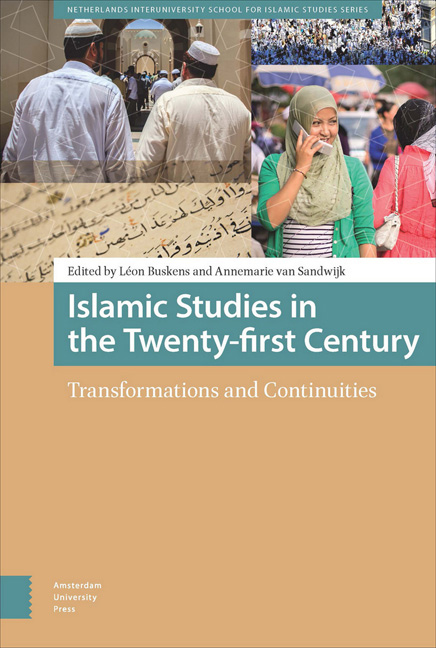Book contents
- Frontmatter
- Dedication
- Contents
- Preface
- Introduction: Dichotomies, Transformations, and Continuities in the Study of Islam
- Islamic Texts: The Anthropologist as Reader
- Textual Aspects of Religious Authority in Premodern Islam
- What to Do with Ritual Texts: Islamic Fiqh Texts and the Study of Islamic Ritual
- Textual Study of Gender
- Scholarship on Gender Politics in the Muslim World: Some Critical Reflections
- Power, Orthodoxy, and Salvation in Classical Islamic Theology
- Dialectical Theology in the Search for Modern Islam
- “Classical” Islamic Legal Theory as Ideology: Nasr Abu Zayd’s Study of al-Shafiʿi’s al-Risala
- Islamic Law in the Modern World: States, Laws, and Constitutions
- Vernacular Cosmopolitanism as an Ethical Disposition: Sufi Networks, Hospitality, and Translocal Inclusivity
- Middle Eastern Studies and Islam: Oscillations and Tensions in an Old Relationship
- Notes on Contributors
- Overview of NISIS Autumn Schools, 2010-2014
- Index
What to Do with Ritual Texts: Islamic Fiqh Texts and the Study of Islamic Ritual
Published online by Cambridge University Press: 12 December 2020
- Frontmatter
- Dedication
- Contents
- Preface
- Introduction: Dichotomies, Transformations, and Continuities in the Study of Islam
- Islamic Texts: The Anthropologist as Reader
- Textual Aspects of Religious Authority in Premodern Islam
- What to Do with Ritual Texts: Islamic Fiqh Texts and the Study of Islamic Ritual
- Textual Study of Gender
- Scholarship on Gender Politics in the Muslim World: Some Critical Reflections
- Power, Orthodoxy, and Salvation in Classical Islamic Theology
- Dialectical Theology in the Search for Modern Islam
- “Classical” Islamic Legal Theory as Ideology: Nasr Abu Zayd’s Study of al-Shafiʿi’s al-Risala
- Islamic Law in the Modern World: States, Laws, and Constitutions
- Vernacular Cosmopolitanism as an Ethical Disposition: Sufi Networks, Hospitality, and Translocal Inclusivity
- Middle Eastern Studies and Islam: Oscillations and Tensions in an Old Relationship
- Notes on Contributors
- Overview of NISIS Autumn Schools, 2010-2014
- Index
Summary
The study of Islamic ritual has suffered, in a sense, from either too much contact with reality or not enough. This is a too summary way of saying that the study of Islamic ritual has been hampered by estrangement between observation-based studies of Islamic ritual as it actually occurs in the world, and the text-based study of Islamic ritual as it has been prescribed, transmitted, and imagined in works of Islamic law (fiqh). The observation-based studies have been for the most part particularist – a description of Islam in “Fulanabad” which is juxtaposed to an imagined universal “Islam of Everywhere” (or of the “scholars” or of “the theologians” or of “the orthodox”) compared to which Fulanabad's Islam is “unique.” Because of the ethnographers’ imagined dichotomy between the local and the hegemonic universal, anthropologists have seldom studied the “universal practices” of Islam, the so-called “Five Pillars” for example, but have focused on the demotic forms of religion – saint veneration, healing practices, spirit propitiation and exorcism, and the like.
Textualists, for their part, have blithely imagined that the Islam of texts is the Islam of practice, without considering what ritual texts actually represent, what they do, what they effect. Either these texts are taken as recipes for Islamic practice that self-substantively provide all there is to know of Islamic rituals, or they are felt to require explanation, and for this, Islamic scholars have turned to commentaries (tafsīr), mystical exegesis (al-Ghazali's Ihyaʾ ʿUlum al-Din is popular; Ibn ʿArabi gets some attention) or the hadith works – without grasping that the hadith works are themselves commentarial responses to the laconic texts of the Qurʾan and nascent fiqh. The problem of ethnographers’ blindness to ṣalā, hajj, fasting, or other text-related Islamic practices can be left for another discussion. For this chapter it is the study of Islamic ritual texts that will occupy us.
In what follows I want to suggest that both of the textualist moves described above – the recipe approach and the commentarial approach – misunderstand ritual itself and Islamic ritual in particular. Islamic ritual is, however, the perfect place to consider how textual ritual, and ritual texts, should be studied.
- Type
- Chapter
- Information
- Islamic Studies in the Twenty-first CenturyTransformations and Continuities, pp. 67 - 86Publisher: Amsterdam University PressPrint publication year: 2017



